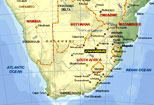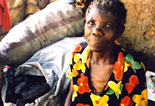
|

|

|

|
|
|
|
Regional Service Centre, Johannesburg
|
MDG Watch
The Millennium Development Goals
April edition, Issue 1
MDG Watch is a Quarterly publication compiled by SARPN with the support of its partners, the Centre for Policy Studies (CPS) and the United Nations Development Programme - Regional Service Centre (UNDP-RSC).
|
|
|
[ Share with a friend  ]
]
|
Greetings from SARPN!
Welcome to this first issue of the MDG Bulletin. The Bulletin is a product of the joint efforts of SARPN and its cooperating partners, the Centre for Policy Studies (CPS) and the United Nations Development Programme (UNDP) Regional Services Centre. MDG Bulletin responds to the need for a regional quarterly and up to date publication which arouses interest, awareness and keeps the development workers in the SADC region (and beyond) informed about and engaged with developments and progress in the fight against poverty in the context of the Millennium Development Goals (MDGs).
The MDGs are widely believed to offer the most comprehensive framework for the reduction of poverty. The MDG Bulletin is intended as a platform for debate and information exchange on practices and strategies around the framework. The MDG Bulletin is also intended to provide the space for a range of voices to interrogate underlying and emerging assumptions and trends as well as the policies and activities that relate to the MDGs. While the focus of the Bulletin is the SADC region, inevitably, and as a result of the global nature of the MDGs and, indeed, the global nature of poverty, some of the perspectives included may have relevance beyond the region.
The content of the MDG Bulletin will comprise a diverse range of articles and stories drawn from distinguished development workers ranging from consultants, academics, individuals working in different types of civil society and private sector organisations as well as policy makers. Attached for your perusal is the first issue of our Bulletin and we will be glad to receive your comments and feedback on the same.
We hope that you will find the information useful for your work.
Ms Sue Mbaya
SARPN-Director
|
Disclaimer: The views and positions expressed in this Bulletin are entirely the authors’ and do not necessarily reflect those of SARPN, CPS and the UNDP RSC.
|
Content
The MDGs and Africa: The Elusive Partnership?
By Chris Landsberg
The MDGs: a global pact?
 In September 2000, 89 countries met at United Nations (UN) headquarters in New York amid great fanfare to adopt the Millennium Development Goals (MDGs). The MDGs sought to generate international consensus to eliminate international poverty and bring about accelerated development. But is the MDGs a global pact, one that binds African states into mutual accountability and mutual responsibility arrangements? No! The MDGs are just a list of wishes and hopes on international development; while it is path-breaking, the MDGs is but a mere promissory note committing states to substantially address the needs of the poor, in particular those residing in developing countries... In September 2000, 89 countries met at United Nations (UN) headquarters in New York amid great fanfare to adopt the Millennium Development Goals (MDGs). The MDGs sought to generate international consensus to eliminate international poverty and bring about accelerated development. But is the MDGs a global pact, one that binds African states into mutual accountability and mutual responsibility arrangements? No! The MDGs are just a list of wishes and hopes on international development; while it is path-breaking, the MDGs is but a mere promissory note committing states to substantially address the needs of the poor, in particular those residing in developing countries...
Read more...
Downstream commitments crucial for the achievement of the MDGs in Southern Africa
By Emmie Sekai Wade – Development Economics Independent Consultant. ()
This paper uses primary sources to highlight salient points inherent in the MDGs architecture, requiring further discussion by the civil society.
Introduction
 If the MDGs are to be achieved in southern Africa, they need to be grounded in national ownership. This requires solid and capable structures at grassroots level that can consistently and continuously monitor state machinery to ensure macroeconomic discipline, bolstering of agriculture productivity, increased support to infrastructure development, strengthening of institutional capacity and improvement in the management of public expenditures. The challenge is to be able to "own" the MDG process, which is globally adopted and set within a long-term framework. The problem with universal indicators is that it is assumed the playing field is level with MDGs being presented in absolute terms... If the MDGs are to be achieved in southern Africa, they need to be grounded in national ownership. This requires solid and capable structures at grassroots level that can consistently and continuously monitor state machinery to ensure macroeconomic discipline, bolstering of agriculture productivity, increased support to infrastructure development, strengthening of institutional capacity and improvement in the management of public expenditures. The challenge is to be able to "own" the MDG process, which is globally adopted and set within a long-term framework. The problem with universal indicators is that it is assumed the playing field is level with MDGs being presented in absolute terms...
Read more...
Impact of Macroeconomic Policies on the Attainment of the MDGs
By Jack Jones Zulu - Programme Manager Economic Dimensions - SARPN
Introduction
 The millennium development goals (MDGs) which are global benchmarks for tackling poverty within a specified time frame have been widely accepted as a framework for measuring development progress. Other things being equal, they are expected to bring about significant, measurable and sustainable improvements in the lives of people across the world. They aim at arresting the growing tide of poverty especially in the Third World countries, and therefore developing countries are expected to be active at national levels while developed countries also have a corresponding obligation to ensure an international environment conducive to development... The millennium development goals (MDGs) which are global benchmarks for tackling poverty within a specified time frame have been widely accepted as a framework for measuring development progress. Other things being equal, they are expected to bring about significant, measurable and sustainable improvements in the lives of people across the world. They aim at arresting the growing tide of poverty especially in the Third World countries, and therefore developing countries are expected to be active at national levels while developed countries also have a corresponding obligation to ensure an international environment conducive to development...
Read more...
MDG-Based PRSPs Need More Ambitious Economic Policies
By Terry McKinley
Introduction
 Recent efforts to strategically link PRSPs to MDGs are beginning to dramatically alter international assessments of poverty reduction strategies and pro-poor economic policies. By calling for big increases in external and domestic resources to meet the MDGs, the U.N. Millennium Project has contributed to this re-assessment. It has helped stimulate a new global debate, in particular, on the need for more expansionary public-investment led economic policies (www.unmillenniumproject.org). Meanwhile, a broad range of UNDP regional initiatives in Asia-Pacific and the Arab States and country studies in the Caucasus/Central Asia and Africa are confirming the need for more pro-growth and pro-poor economic policies... Recent efforts to strategically link PRSPs to MDGs are beginning to dramatically alter international assessments of poverty reduction strategies and pro-poor economic policies. By calling for big increases in external and domestic resources to meet the MDGs, the U.N. Millennium Project has contributed to this re-assessment. It has helped stimulate a new global debate, in particular, on the need for more expansionary public-investment led economic policies (www.unmillenniumproject.org). Meanwhile, a broad range of UNDP regional initiatives in Asia-Pacific and the Arab States and country studies in the Caucasus/Central Asia and Africa are confirming the need for more pro-growth and pro-poor economic policies...
Read more...
Latest and related publications

SARPN Physical address: 1250 Pretorius Street, Office W2, ProEquity Court, Hatfield 0083
SARPN Postal address: PO Box 11615, Hatfield 0028, South Africa
Email:
|
|






